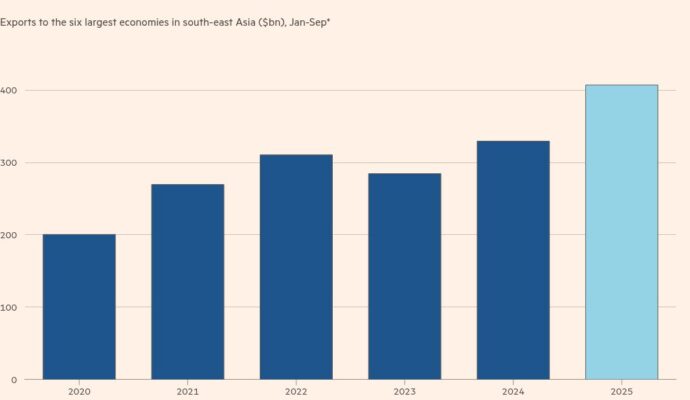
Unlock the Editor’s Digest for free
Roula Khalaf, Editor of the FT, selects her favourite stories in this weekly newsletter.
Tinker, tailor, soldier, sailor, pharmacist, tax accountant, bus driver, chef. Name the profession, and Japan is likely running perilously low on its practitioners — not just to the point of inconvenience, but to somewhere a little more existential.
So while there is much to welcome in the ruling Liberal Democratic party’s election of Sanae Takaichi as both its new leader and (we may reasonably assume) the country’s first female prime minister, it is hard not to see some cruelty in the selection.
Her route to power has been set out by inflation, by the deep discomfort it is causing a nation and by her predecessor’s failure to address it. To survive, Takaichi must somehow create public comfort with rising prices while inheriting an economy grappling with the “enshortification” of everything.
After 70 years of nearly unbroken power, the LDP is low on new ideas, and the country is paying the price for many old ones that did not work. More unsolvable than that, though, are decades of adverse demography, the simultaneous ripening of related crises and the increasingly unmissable shrinkage of the workforce.
Those realities leave anyone taking over at this juncture as likely to fail — on multiple fronts, and in ways that their predecessors were largely spared because none of it had quite come to a head as it is now.
Insufficient workers, an ageing workforce, constrained ability to adapt to emerging opportunities, service shrinkflation and the steady contraction of customer satisfaction: Japan’s labour shortages have an acuteness and immediacy to them that make the suggestion that AI, robots or some other technology will quickly step in to save the day sound glib.
Take carpenters — essential in a country where a great deal of construction uses wood. Their numbers have more than halved since 2020, while more than 43 per cent of those still working are over 65. Many projects, large and small, are being delayed. A shortage of bus drivers has caused operators in Tokyo to cut over 200 services. The military cannot get close to its recruitment targets. The Foreign Ministry revealed earlier this year that it cannot hire enough Japanese chefs for its embassies. In some parts of the countryside, home deliveries of certain goods are undertaken by scooter riders in their mid-80s. There are genuine concerns across industry that companies are going to run into trouble because Japan no longer has enough tax accountants.
The list goes on. The effect of all this enshortification is that, after decades building an expectation of world-class service, everything feels just a little worse, a little slower, a little less personal, a little less polite, a little messier. Of course, Japan can absorb all of this. Its effect, though, is to exacerbate the sense of affliction caused by prices rising at levels higher than average salaries. Voter anger has been exploited by new populist parties, but it is no less genuine for that.
Takaichi does not have a lot of options, because enshortification is now baked into Japan’s demographics. Her pledge, minutes after winning last Saturday’s leadership race, that she would abandon work-life balance and toil like a horse may work for her. It isn’t a national policy. Some industries will, inevitably, hone non-human solutions to many of their labour shortage problems, and let the tech do the toiling.
But Takaichi knows that large-scale immigration will, for some years to come, represent Japan’s best hope. And here, perhaps counter-intuitively, her nationalism and hardline conservatism put her at an advantage in two important ways.
The first is that Takaichi has spent three decades in politics making herself quite difficult to attack from the right, even if she leaves the immigration taps relatively wide open. Her scepticism on immigration is a matter of record, her projected fear of an erosion of Japanese culture authentic: if she opens the turnstiles in the face of enshortification, she can present that as reluctant realism.
The second advantage is that Takaichi, unlike her predecessors in the PM’s office, has shown a willingness to discuss immigration in the open, and treat the subject as a necessary public debate.
That is shrewd. Where public anger has been stirred, it has been directed not at immigrants themselves, but at the absence of a serious discussion about what continuing mass immigration means for Japanese culture, public finances and the national sense of self.
Takaichi has given herself the tools to lead that debate, and survive it. Enshortification provides a strong motive to do that now, rather than later.


